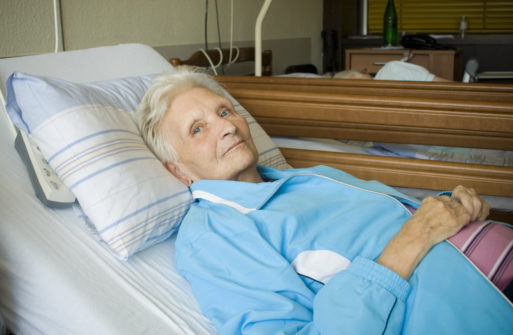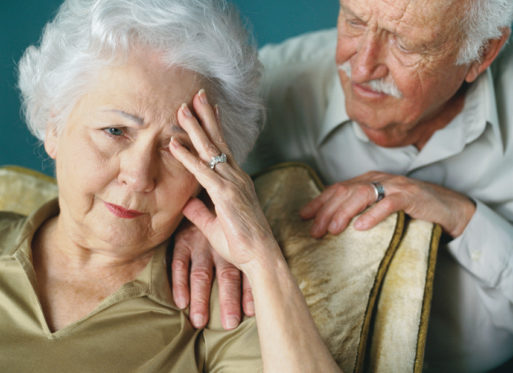As a rule, breast cancer surgery is considered a low-risk procedure, even in the elderly. But a recent study published in JAMA Surgery has called into question the wisdom of surgery in women who are elderly and medically frail. After reviewing the records of nearly 6,000 nursing home residents who had inpatient surgery for breast cancer during the preceding decade, researchers found that 31 to 42 percent of them died within one year. This was considerably more than the 25 percent of nursing home residents who typically die within a given year.

Frail, elderly women don’t benefit from breast cancer surgery
Credit: jerebeasley.com
Additionally, nearly 60 percent of nursing home residents who survived at least one year after breast cancer surgery suffered a significant loss of functional independence, as measured by their ability to perform activities such as bathing, dressing, and feeding themselves. The loss of function and increased mortality occurred whether the patient had a lumpectomy, a mastectomy or a mastectomy with axillary lymph node dissection (ANLD). However, functional decline was most severe in those who had the most invasive procedures (mastectomy and mastectomy with ANLD).
Breast Cancer Likely Not the Cause of Death
Although the study didn’t look at the cause of death in the patients who died, it was likely not breast cancer, said Laura Esserman, M.D., the director of the UCSF breast cancer center and co-author of the study in a statement to the LA Times.“When someone gets breast cancer in a nursing home, it’s very unlikely to kill them,” she explained. “They are more likely to die from their underlying condition,” she said.
Dr. Victoria Tang, M.D., assistant professor of medicine in the Division of Geriatrics at the University of California-San Francisco and lead author of the study, agreed. She believes the patients most likely died from one or more underlying conditions, which were aggravated by the the surgery and anesthesia. This is supported by the fact that the women who were least able to care for themselves before surgery were most likely to die afterward.
The average age of the nursing home residents in the study was 82, and many had at least one serious health condition prior to their surgery. This included cognitive decline (57 percent) diabetes (36 percent), heart failure (22 percent), and chronic lung disease (17 percent). Additionally, 12 percent of the women had survived a heart attack.
A Change in Approach?
Unfortunately, the study didn’t answer some important questions. For example, the researchers did not know whether the patients who fared poorly had chemotherapy or radiation therapy after their surgery, which could have made them more ill. However, they did state that only 6 percent of nursing home patients who undergo breast cancer surgery receive radiation or chemo. Thus, it’s unlikely that treatment-related side effects contributed in any meaningful way to the high percentage of deaths.
The study also excluded healthier nursing home residents, who might do better after surgery than those who were already medically frail.

Women with advanced cognitive impairment should skip mammograms, experts say
Credit: pinterest.com
Still, the study suggests that routine breast cancer screening may not be warranted or advisable for women in their 80s who are residents of a nursing home. According to the American Cancer Society’s latest guidelines, women should continue breast cancer screening only as long as they are in good health and reasonably expected to live at least another 10 years. Medically frail women with multiple health challenges don’t fall within this group, said Deborah Korenstein, M.D., chief of general internal medicine at New York’s Memorial Sloan Kettering Cancer Center. Thus, screening them for breast cancer “makes no sense.” “The harms of doing anything about what you find are far going to outweigh the benefits,” Korenstein said.
Yet, a 2010 study published in the journal Research and Practice showed that nearly 1 in 5 women with severe cognitive impairment underwent screening mammography between 1992 and 2002, despite having a median life expectancy of about 3.3 years. In women with a high net worth who were married, that percentage rose to nearly 50 percent.
A Hard Trend to Stop
Cancer prevention has been a mainstay of American health care policy for decades. And in many cases, increased screening has been proven to save lives. But as the American population ages, now is the time to reevaluate our approach and consider potential benefits versus potential harms. “People think, ‘Oh, a lumpectomy is nothing,’” Dr. Esserman said. “But it’s not nothing in someone who is old and frail.” Sometimes taking a “wait and see” approach is the kindest and most appropriate treatment of all.

 Breast Cancer Surgery Harmful in Frail Nursing Home Residents
Breast Cancer Surgery Harmful in Frail Nursing Home Residents


 How Dare You Die Now!
How Dare You Die Now!
 Debating Medical Aid in Dying
Debating Medical Aid in Dying
 “Help Me, Helen”
“Help Me, Helen”














